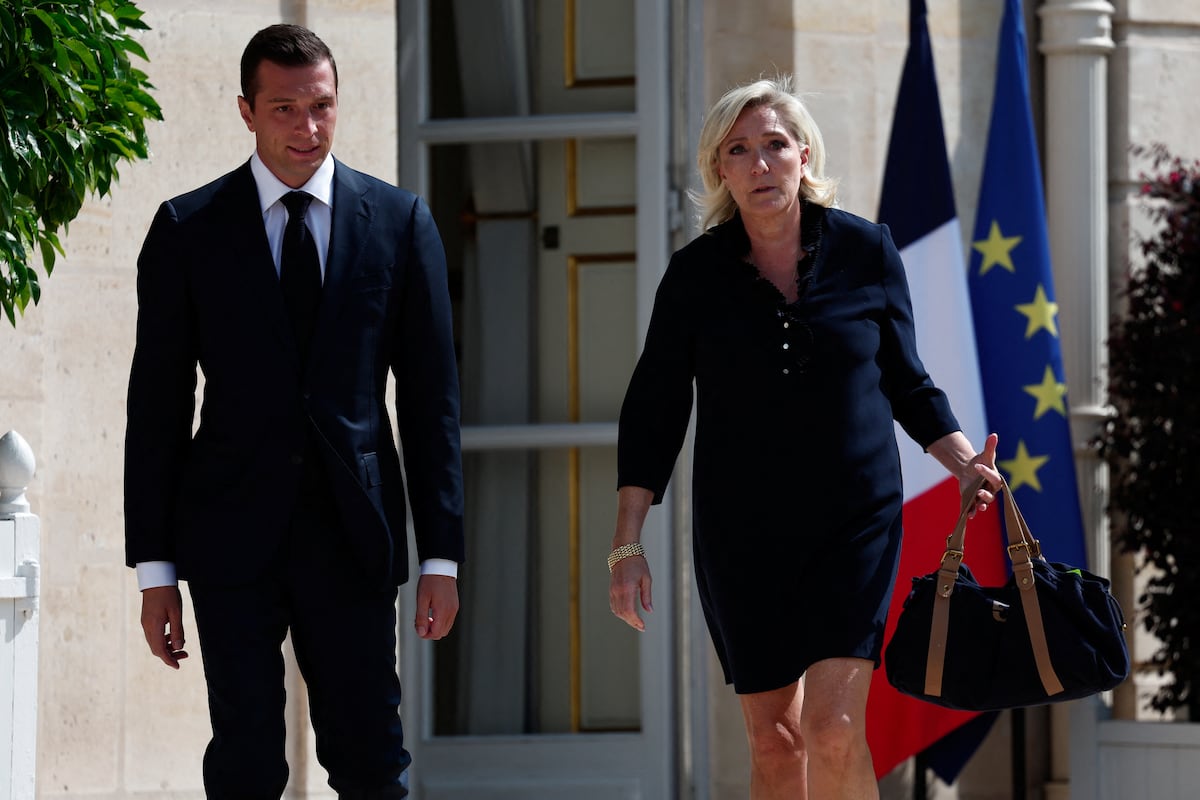Macron ends political consultations without revealing secrets about future prime minister | International

French President Emmanuel Macron resumed this Monday the consultations with the political parties that make up the parliament, which began on Friday and which, according to the Elysée, will end with the announcement of the prime minister. The pressure is now mounting to name a government after the country did not have a clear majority after the last legislative elections. On the last day of negotiations, the president met with the leadership of the far-right National Regroupment (RN), who confirmed that he would condemn “any left-wing government”. Jean-Luc Mélenchon, founder of the left-wing party La Francia Insumisa, opened the door on Saturday to the formation of a left-wing executive without ministers from his party to prevent the veto of other parties.
Macron also met with RN ally Eric Ciotti, who belongs to the far-right sector of the Republicans (LR, right), with the president of the National Assembly, Yaël Braun-Pivet, and with his Senate counterpart, Gérard Larcher. What now? For the moment, the mystery remains. The head of state could hold another round of consultations on Tuesday or address the country on television to clarify the situation and explain why he needs more time. However, leaders of the left-wing New Popular Front (NFP) coalition announced they would not meet Macron again unless it was to discuss forming a government with their candidate, Lucie Castets.
The second round of elections on July 7 left the country in limbo, with a chamber divided into three blocs far from an absolute majority of 289 deputies. The left-wing coalition, which brings together La Francia Insumisa (LFI), Socialists, Communists and environmentalists, obtained the largest number of seats in the assembly (193 out of 577) and therefore sought to appoint a prime minister. But Macron has so far refused to name the candidate of the united left, with whom he met on Friday.
The leader defends that, since there is no faction with a majority, a majority coalition must be formed with representatives of the center, the left and the moderate right. The objective, he stressed, is to obtain a “solid”, stable and “necessarily plural” majority. He said this in a letter to the French in mid-July and in a television interview on July 23, just before the Paris Olympics.
The Fundamental Law does not set a deadline for the head of state to appoint a prime minister. But time is running out. The government has been in power since July 16 and this situation is beginning to create a certain impatience within the population. The Paris Paralympic Games begin on Wednesday and France must approve the 2025 budget and present it to the lower house of parliament before the first Tuesday in October.
To sort out the situation and clarify the positions of the different political forces – or to buy time – Macron began a series of consultations on Friday. It started with the NFP, followed by members of the presidential bloc, which obtained 166 deputies, and the conservative party Los Républicains, which secured 47 seats. On Monday it was the turn of the RN, which came in third in the last election with 126 deputies despite leading in all the polls. Far-right leader Marine Le Pen visited the presidential palace with her dolphin, Jordan Bardella.
To know what happens outside is to understand what will happen inside, don’t miss anything.
keep reading
After the meeting, Le Pen accused Macron of being responsible for the “political chaos” the country is experiencing and stressed that the RN would vote on a censure motion against “any left-wing government.” In recent days, both LR and members of the presidential bloc indicated that their groups would censure an executive if it included members of the LFI, the party that has the most weight in the NFP. Over the weekend, Mélenchon made a splash and asked if the left would no longer have a veto over a government if his party agreed not to join it. “If they answer ‘no’, we can say that the rebel ministers are only a pretext, and what you don’t want is the program of the NFP,” he said in a television interview.
The absence of LFI ministers in the new executive “changes absolutely nothing,” Le Pen insisted. “The New Popular Front is led by La Francia Insumisa,” he added. Reactions to Mélenchon’s question continued throughout the weekend. Macron’s ally, centrist François Bayrou, said the opposition to the NFP government was not due to the LFI’s presence but because of the coalition’s program. “It’s a dangerous program for the country,” he said. The left-wing coalition has proposed, among other things, canceling Macron’s pension reform – which raised the retirement age from 62 to 64 and sparked a wave of protests across the country – and raising the minimum wage to 1,600 euros. The current figure is around 1,400 euros.
Macron is not legally bound to name a prime minister in the coming hours. But the pressure is constantly increasing. With this the round of discussions ended Rentree – The beginning of the course – from Medef, the French employers’ association. Its president, Patrick Martin, said: “Business owners are worried and we must not make them panic by letting the murky political situation last too long.”
Follow all international updates Facebook And Xor in Our weekly newsletter,
(TagstoTranslate)France
